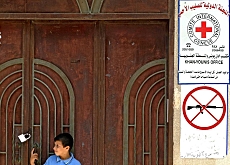
ICRC prepares for Israeli pull-out

After a spate of kidnappings of foreigners, the Swiss-run International Committee of the Red Cross (ICRC) has suspended field operations in the Gaza Strip.
Nevertheless it is busy preparing to help Palestinian victims during and after Israel’s withdrawal of settlers and soldiers this week.
“We’re monitoring this disengagement plan from the Israeli side of the Gaza Strip closely,” Iyad Naser, ICRC spokesman in Gaza, told swissinfo.
“Once the security situation improves we hope we can return to normal,” he said. ICRC employees are restricted to office work until further notice.
At midnight on Sunday, the presence of Jewish settlers in Gaza became illegal.
Early on Monday, Israeli troops began going from home to home, knocking on doors and telling settlers they have to leave. After a two-day grace period, the forcible removal is set to begin on Wednesday.
Naser said the decision to suspend field operations came after two UN employees – a Swiss and a Briton – and a Palestinian worker were abducted by gunmen in the Khan Younis refugee camp last Monday.
Gun battles ensued between police and the gunmen, members of the dominant Fatah movement. The hostages were freed unharmed but two civilians were wounded in the fighting.
Several other international relief workers have been briefly held by gunmen in Gaza recently, often to press grievances against the Palestinian Authority over jobs or the jailing of family members.
Safety guarantees
Naser said the ICRC was engaged in talks with both sides – the Palestinian Authority and the gunmen – to find out when they can resume their activities in the field.
“The Palestinian Authority is responsible for the security of the Palestinian area of the Gaza Strip,” he said. “On the other hand, the people who were involved in this incident should also give the ICRC a guarantee that we will not be targeted.”
Naser says the ICRC is heavily involved in the assessment and collection of data in order to be well-prepared for the period during and after disengagement.
“We are preparing for any kind of scenario regarding the humanitarian concerns of the Palestinian population,” he said.
Naser’s main concerns are the Palestinians living in so-called enclave areas – areas surrounded by Israeli settlements.
“Some of these areas could be closed, so the ICRC is concerned about these people’s access to health, water and food during the period of the disengagement plan,” he said.
“We have already stocked food and other items in locations around the Gaza Strip. We have also given the Minister of Health of the Palestinian Authority medical supplies.”
Turning point
Naser is cautiously optimistic about the future.
“I think this is one of the moments when the Palestinian population will have more access to their own day-to-day living,” he said. “I hope they will have more freedom of movement after the disengagement plan.”
“For the first time the Palestinian territories will be open for trade, for a free economy,” he added. “I think it will change a lot in terms of human dignity.”
According to Naser, it is impossible to say how long the ICRC will remain in Gaza, “but [we are] committed to serving the victims of the situation as long as they need our help”.
swissinfo, Thomas Stephens
Until now around 1.4 million Palestinians and 8,500 Israelis lived in the Gaza Strip.
In February 2005 the Israeli government voted to implement Prime Minister Ariel Sharon’s plan for unilateral disengagement, which begins this week.
Around 55,000 soldiers and police will be involved in the forcible removal of resisters.
Polls show most Israelis favour leaving Gaza.
The Geneva-based ICRC was founded in 1863 by Henri Dunant, a Swiss businessman and humanitarian.
It works mainly to protect the victims of conflict by providing humanitarian assistance and conducting prisoner of war visits.

In compliance with the JTI standards
More: SWI swissinfo.ch certified by the Journalism Trust Initiative






























You can find an overview of ongoing debates with our journalists here . Please join us!
If you want to start a conversation about a topic raised in this article or want to report factual errors, email us at english@swissinfo.ch.